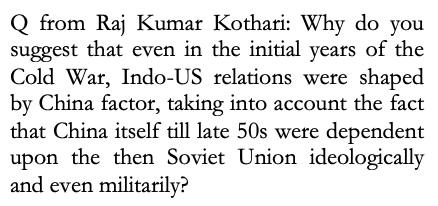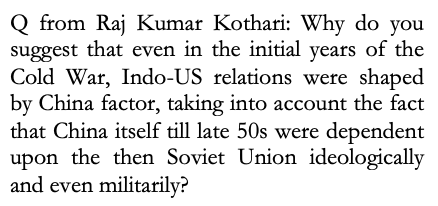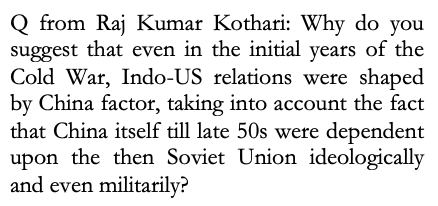This was a lot of fun to do. Thanks v much to @ORF, Dr. Nilanjan Ghosh & @ananthkrishnan. As promised, on Twitter I& #39;ll answer some of the questions that we didn& #39;t get to that came in through the chat function 1/ https://twitter.com/orfonline/status/1253610841938649088">https://twitter.com/orfonline...
A: On China front what changed is US & Indian views of that country & how to deal w/ it. When those perceptions & approaches converged, it brought the US & India together; when they diverged -- e.g. in 1949-1956, 1971-72 - it caused US-I friction 2/ https://twitter.com/NaraayanKannan/status/1253687552344645635?s=20">https://twitter.com/NaraayanK...
A: Personalities mattered, but they hv been overemphasized in US-India narratives. e.g. Nixon went from arguing vs India in early 50s to advocating for aid to it in the late 50s, & from IDing its future importance in & #39;67 to seeing it as a prob in & #39;71 3/ https://twitter.com/NaraayanKannan/status/1253687552344645635?s=20">https://twitter.com/NaraayanK...
A: Re the USS Enterprise - focused on US-C rapprochement cuz of USSR/Vietnam, Nixinger wanted to show China they cld be credible allies. Thought sending E in support of Pak wld show Beijing (a) US was reliable & (b) possibly encourage China to intervene 4/ https://twitter.com/NaraayanKannan/status/1253687552344645635?s=20">https://twitter.com/NaraayanK...
A: some issues same as before tho to diff degrees, incl Pak, Russia. More broadly, drivers:
- strat (China, other being helpful on global/reg stage)
- econ (mkt access, jobs, tech, tourism, educ)
- values-linked (ppl-to-ppl, dem/HRts)
These can be subjects of difference too 5/
- strat (China, other being helpful on global/reg stage)
- econ (mkt access, jobs, tech, tourism, educ)
- values-linked (ppl-to-ppl, dem/HRts)
These can be subjects of difference too 5/
Ans: (i) No. of countries (Quad, Eur, Can) dealing w/ (a) increasing concerns abt China (b) reality of (esp econ) interdependence. But important to remember that PRC needs these countries too. Acting collectively, they can hv more leverage. 6/ https://twitter.com/sourav1896/status/1253688688263016449?s=20">https://twitter.com/sourav189...
Ans: (ii) whatever US rhetoric, it won& #39;t totally decouple -- & China won& #39;t completely shut it out. But you& #39;ve already been seeing both sides reconsider the nature of econ engagement/dependence. Current devps likely to reinforce that rethinking 7/ https://twitter.com/sourav1896/status/1253688688263016449?s=20">https://twitter.com/sourav189...
A (i): US thought democratic, non-communist India cld be a counterbalance & democ contrast to Soviet-backed China; initially India wasn& #39;t seen as playing along & even adding to US& #39; Sino-Soviet problem. But then US, India views of China - tho not USSR beyond a point - converged 8/
A (ii): Around 1956-57, India started to view China as more of a geopol challenge (boundary, Tibet, Nepal). Leaders also concerned that communism wld "deliver" economically next door. Re both these problems, they saw US as a solution - first, economically & then, militarily 9/
A (iii): Also less known, but 1956-58 is when disillusionment re Moscow grows among Indian officials thx to its actions re Hungary, Yugoslavia. Nehru thinks USSR wants camp followers & sees it using coercion/violence vs its own partners. 9/
A (iv): Nehru & others saw PRC attitudes re Hungary, Yugo as worse than Soviet ones. But PM& #39;s disappointment w/ Moscow clear in papers. Also a public sign of it in an article he wrote in & #39;58. Angry Soviet ambo then criticized him publicly & added China doing so much better 10/
[Pausing for now, but will take this thread up again soon and answer the remaining questions that came up in the ORF book talk for #FatefulTriangle] 11/

 Read on Twitter
Read on Twitter






